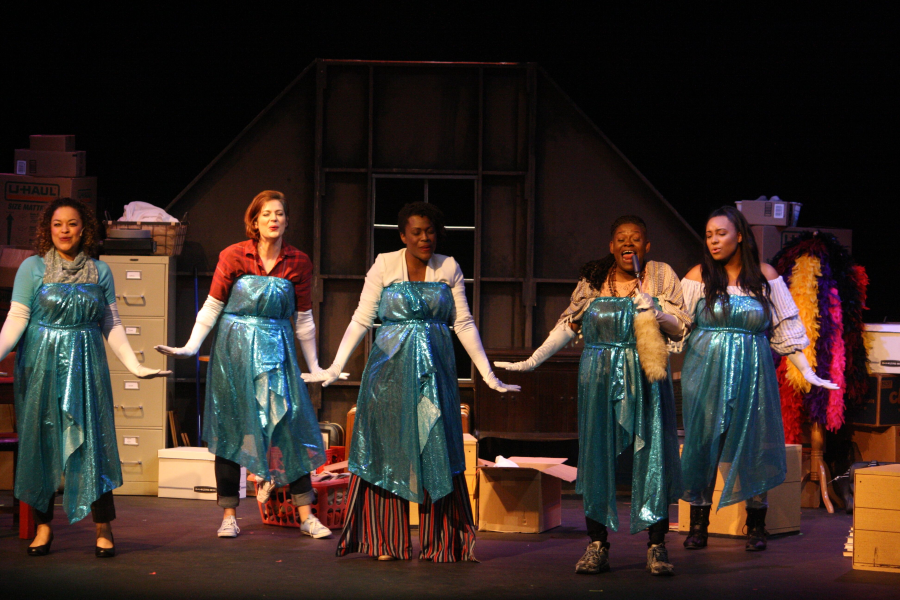NASHVILLE: Tennessee’s capital city is filled with legendary music venues and destinations, including the famed Grand Ole Opry and the Country Music Hall of Fame. But there’s more than just tunes in Music City. Among the throng of honky-tonk bars in downtown Nashville is the Z. Alexander Looby Theatre—home to the Tennessee Women’s Theater Project (TWTP). American Theatre caught up with company’s founding artistic director, Maryanna Clarke, via email to learn more about producing theatre in a changing Nashville. “As the neighborhood sprouts with apartments, condos and houses locally known as ‘tall skinnies,’ thousands of new residents are poised to discover professional theatre within a short walk from home,” she says.
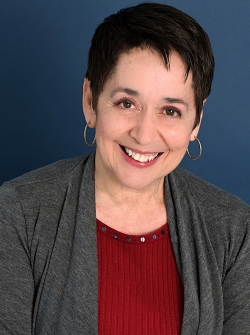
Who founded Tennessee Women’s Theater Project, when, and why?
I founded TWTP in 2003. A few years earlier, my husband, Chris, and I had become the legal guardians of our six-year-old niece, Kate, whose mother (Chris’s sister) died in a car accident. I was working as an actor and a singer at the time filling in the income gaps as a temp legal secretary.
As “instant parents,” we didn’t know the ins and outs of childcare or babysitting, so Kate came along to everything, including my auditions. One night I was driving home from an audition for a play with one female role and a bunch of male roles. A large number of women showed up to read, and too few men to cast all the male roles (in other words, a pretty typical audition for a pretty typical play). On the way home, seven-year-old Kate spoke up from her booster seat behind me: “When I grow up, I want to be just like you…” Those words would melt any mother’s heart, but given our circumstance, they meant the world to me. But my moment of private joy was brief; she finished that thought with, “I want to act, and I want to type.” Those nine words changed my life forever. In that instant I realized I had to give her something more to aspire to! But I didn’t know what that could be.
After a couple of years of soul searching, the idea for Tennessee Women’s Theater Project erupted in my brain. I ran the idea past Chris and some theatre friends (both male and female), and everybody thought it was a solid one. Still, I felt I needed credentials to convince people, and myself, that I could do this, and was worthy of serious regard from the theatre community, grant makers, and potential funders. I decided to go back to school to finish my undergraduate degree. I enrolled in Middle Tennessee State University (MTSU) and became an OWL ( Older Wiser Learner), as MTSU refers to its non-traditional-age students.
What followed was two-and-a-half years of a daily 100-plus-mile commutes between our home in the suburbs north of Nashville and MTSU; a husband who got good at cooking and doing Kate’s hair in a ballet bun for dance classes; and a degree in theatre with a minor in entrepreneurship. Several relatives traveled from my home state of New Jersey to watch me receive my diploma—I was the first in our family to graduate college. The graduation gifts they gave me paid the 501(c)(3) application fee, and TWTP was born!
Tell us about yourself and your connection to the company.
I started my creative life as a singer in New Jersey. I attracted some interest from record labels in Nashville, so my husband and I moved here more than 30 years ago to pursue my music career. Almost as soon as we arrived, I began to have voice problems. Nashville is known for its allergy-inducing array of pollens, so initially we thought that was the cause. Nashville also has one of the premier voice centers in the country, the Vanderbilt Voice Clinic, so, that’s where I went. It took a few visits, but I was finally diagnosed with a neurological disorder and focal dystonia: adductor spasmodic dysphonia (ADSD). I spent more than a year in denial—surely I didn’t have a voice-wrecking disorder with no known cause or cure!
Before my diagnosis, my voice coach suggested I give myself a break from singing. “Take an acting class,” she said. I fell in love with the stage and discovered my new creative home. For a time, I was still able to speak without too much disruption. Eventually, ADSD, which had ended my singing career, also ended my acting career.
I decided to bloom where I was planted. TWTP became my focus and my life’s crusade. (I must add that I still deeply miss being able to sing.)
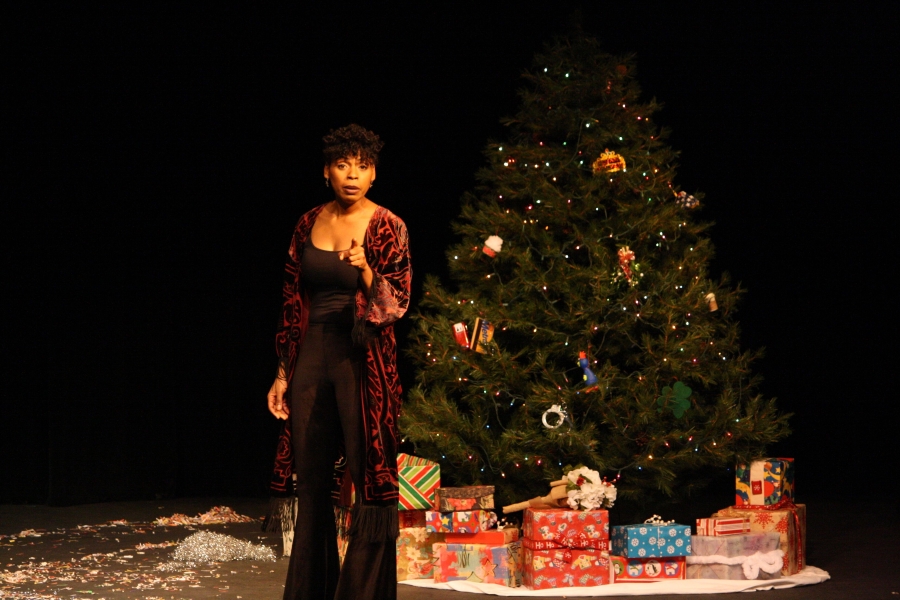
What sets your theatre apart from others in your region?
Eva Le Gallienne, a pioneer of regional nonprofit theatre in the 1920s, said, “The theatre should be an instrument for giving, not a machinery for getting.” Tennessee Women’s Theater Project is a company in that tradition. The question that propels my work is this: “If theatre holds a mirror up to nature, why are there not as many women’s faces in that reflection as I see around me?”
The company grew out of my desire to create a world onstage that looks more like the one I see around me, and out of a passion for telling stories of the human condition in the female voice. TWTP is dedicated to gender parity, backstage as well as onstage. We don’t produce plays with more male than female characters, and whenever possible we employ female designers and stage managers. We also created Nashville’s oldest and longest-running performing arts festival, our annual Women’s Work. It has introduced the community to art created by women—plays, films, dance, comedy, music, visual arts, and more.
We have a deep commitment to paying artists well. Some companies bill themselves as professional but pay fast-food wages. I could not in good conscience call TWTP a professional company if our artists could make more working at McDonald’s. At the same time, we believe that the price of admission should never be a barrier to the arts, so we charge among the lowest prices in the region.
Our mission also directs us to bring theatre to new and underserved audiences. We work with agencies serving at-risk women and invite their clients to be our guests at our productions. At a recent performance of Dorothy Marcic’s SISTAS: the Musical, more than two dozen clients of the local nonprofit Thistle Farms, a community of women healing from prostitution, trafficking, and addiction, joined our audience.
Our theatre is in a building that is also home to a library and community center. As a way of giving back to the community, the company offers free after-school drama classes to the neighborhood kids.
Finally, all companies have their traditions, and we have one that I believe is unique: When we load into our venue in North Nashville, we mount Susan B. Anthony and Sacagawea dollar coins to the upstage side of the proscenium. The only American women to appear on money, our patron sisters watch over our every entrance and exit.
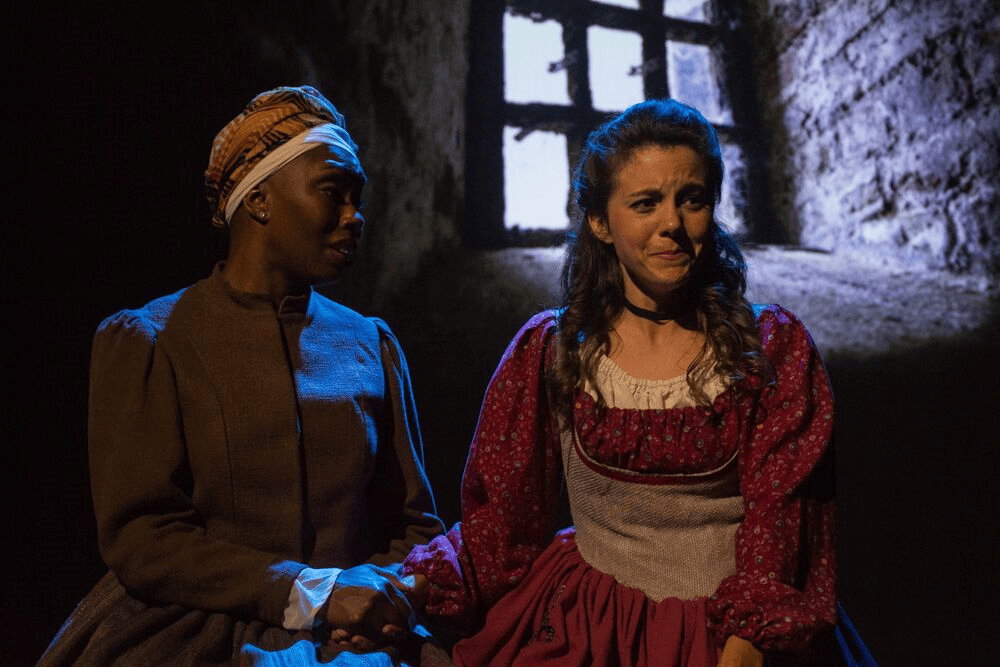
What are the challenges of producing theatre in Nashville?
Theatre in Nashville is a bit of an underground activity. The city’s print media, including the alternative weekly The Nashville SCENE, have stopped reviewing most local theatre. Broadcast outlets, except for the public television station and the community access channel, cover little except the Broadway tours. Just one theatre critic (Jef Ellis, who writes for the Nashville edition of BroadwayWorld) routinely reviews Nashville’s theatre productions. Nashville is growing at a swift (and sometimes scary) pace—people are moving here from places where we feel sure they had a local theatre habit, but those folks are slow to find local theatre because there is no easy way for them to learn about it. They discover the Broadway Series at the downtown Tennessee Performing Arts Center, and many seem to conclude that’s all the city has to offer.
Transportation is also a concern. Our patrons can catch a bus to our shows, but buses stop running soon after the evening rush hour. That means audience members can’t get back home or to their hotel. We’re not the only cultural organization that recognizes and struggles with this.
Tell us about your favorite theatre institution other than your own, and why you admire it.
I have two: McCarter Theatre Center in Princeton, N.J., and Nightwood Theatre in Toronto. I grew up in New Jersey and loved going to McCarter. I love its mix of new works and more well-known pieces. I found it exciting that works could go from Princeton to Broadway. Then there’s Nightwood. Several years ago, I had the pleasure of visiting Toronto and meeting with folks at Nightwood, and several other Toronto companies, thanks to a continuing education grant from TCG. It is Canada’s “foremost feminist theatre, [and] provides an essential home for the creation of extraordinary theatre by women.” The company’s longevity (it’s nearly 40 years old), the support it gets from the community, and its work inspire me.
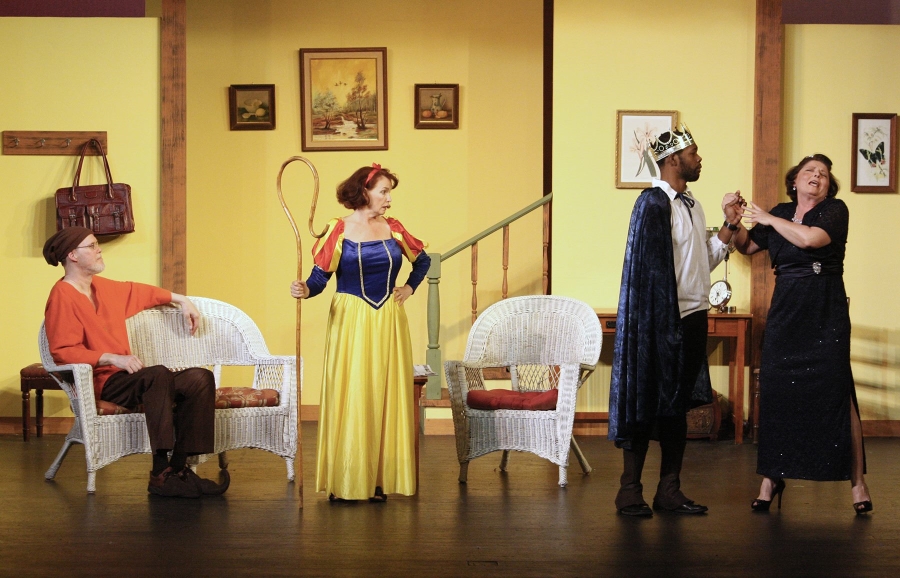
How do you pick the plays you put on your stage?
I am always reading plays, looking for something that speaks to me. What I seek specifically varies from season to season. Sometimes I’m looking for a comedy (because we all need to laugh!) that speaks to current affairs, or a play that addresses a certain issue. For example, we produced Lauren Gunderson’s The Revolutionists last season because it felt especially relevant to today’s politics. I’m always interested in works that are unlikely to be seen on other local stages, or that have not yet been produced here. We were excited and proud to be the first local company to produce Vanya and Sonia and Masha and Spike—and one of a very few companies nationwide to cast an African American Spike!
What’s your annual budget, and how many artists do you employ each season?
We have a tiny annual budget, around $75,000. The number of artists we employ each season varies, depending on the size of the cast and the type of show. We employ an average of 10 per production, including designers, a stage manager, and director. As many as 100-plus artists participate in Women’s Work (which includes the presenters, actors, dancers, musicians, and others), and the submitting artists receive 60 percent of the box office receipts.
What show are you working on now? Anything else in your season that you’re especially looking forward to?
We’re just sending out the call for submissions for Women’s Work 2019, so our summer months will be filled with reading and evaluating those submissions. In our 2019-20 season, we are hoping to land a Creation Grant from Metro Nashville Arts Commission to commission a new work celebrating the 100th anniversary of the 19th Amendment with a new piece derived from the little-known body of polemical and politically adventurous plays that helped incite and inspire the growth of the suffrage movement.
Strangest or funniest thing you’ve ever seen (or put) on your stage?
Our annual festival, Women’s Work, always brings a wide variety of art to our theatre. We have had some very funny/strange things on our stage over the past 12 years, including a couple of clown acts and an aerial act. For me, the funniest, and one of my favorites, was a one-woman show by Belynda Cleare about growing up Black in rural Nova Scotia. Her journey of self-discovery was charming, poignant, and hysterically funny!
What are you doing when you’re not doing theatre?
Time with family is important to me. We visit my New Jersey family several times a year. On a more regular basis, my husband and I take walks on the local greenway with our 70 lb. Baby Huey of a dog, Rowan. I used to run, but surgery for a torn meniscus has put at least a temporary halt to that. I enjoy bird watching. We have a hummingbird feeder outside the kitchen window and seed feeders on our back deck. Last week a couple of black-headed vultures turned up on the deck! (Rowan couldn’t fathom why he wasn’t allowed out to rid us of the meddlesome beasts.)
What does theatre—not just your theatre, but the American or world theatre—look like in, say, 20 years?
Perhaps it looks much the same as it does today: Some proclaiming its demise; many, with more optimism and fire, using every available tool—old and new—to tell stories that are vibrant, inclusive, thought-provoking, meaningful, and relevant to even larger and more diverse audiences.

